
Charitable donations have increased for 6 consecutive years. Online donations themselves grew by over 12% this past year.
So if your fundraising efforts aren’t geared towards an online strategy, you may be leaving a lot of money on the table for your cause or nonprofit.
With the right fundraising strategy in place, your organization can raise the money it needs while building ongoing relationships with its donors and community.
We've got you covered with some tips and tricks for creating an online fundraising campaign, as well as building a fundraising landing page which can be used to increase your total contributions.
Timing is everything
Fun fact: Almost 33% of all annual giving occurs in December—12% happens in the last three days of the year!
You can have an online fundraising strategy at any time during the year, but if you want to communicate with donors when they’re at their most charitable, then you should be planning to heavily promote fundraising in the 4th quarter.
GivingTuesday
In less than 10 years, GivingTuesday has become a worldwide movement with donations exceeding $2.47 billion in 2020, in the US alone.
So planning a fundraising strategy on this “day of giving” is almost a must.
Start showing your fundraiser will be participating in GivingTuesday by using the tools and materials they provide organizations to use. Make sure you include the logos, graphics, and social images in all your fundraising efforts around this day.
Now let's dive into more specific online fundraising strategies.
How to create an online fundraising strategy
Online fundraising is more effective than in-person: no matter where you'd ask for donations in real life, you have an exponentially wider reach on the internet. Plus, online activities and promotions tend to be significantly cheaper. And according to The Nonprofit Source, 54% of today's donors across the globe actually prefer to give online.
How to ask for donations
No matter who you're asking for a donation to your fundraiser, the most important thing is to communicate why you're raising the money and who (or what) the money will be going to.
When donors have a solid understanding of where their money is going, they feel more confident in making their donations and are evenly likely to donate more to your cause.
When crafting a mission statement or explanation for your online fundraising campaign, make it as personal as possible. It's okay to be vulnerable and sincere; in fact, your donors will appreciate it.
Take the time to craft your fundraising mission statement carefully—and make sure it's front-and-center on your donation page.
How to find donors
Now it's time to start building a list of prospective donors. These are the specific people you will be targeting and asking to donate to your cause.
Meeting with members of your organization to brainstorm potential donors is always a good idea, as you may be surprised by some of the more successful leads that your team comes up with. Still, there are a few tried-and-true means of finding donors that you won't want to overlook.
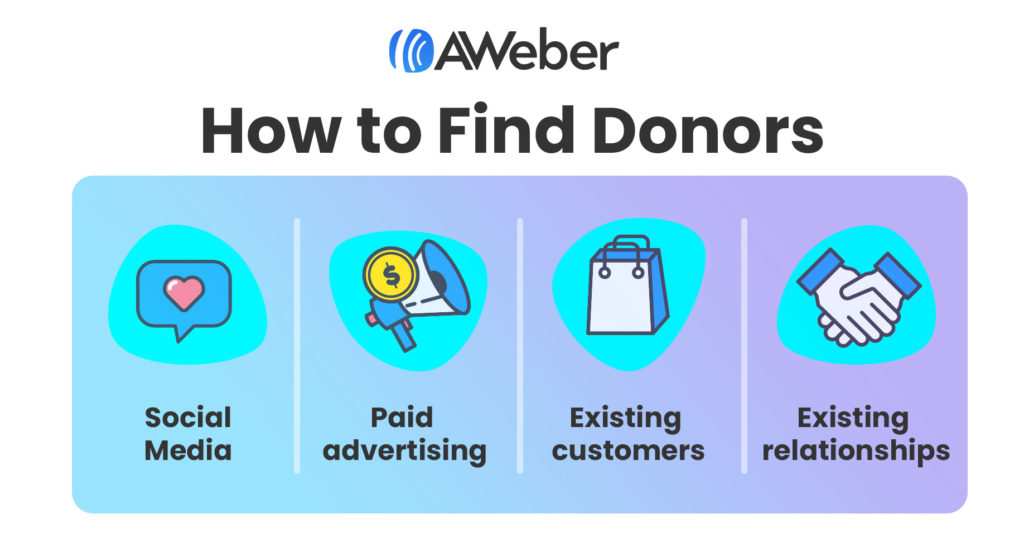
Social media
Social media is an especially fruitful source of fundraising. Take some time to consider which social media platforms your target donors are most often using.
If you could reach an audience organically, that’s the way to go. It’s essentially free advertising.
In order for this to happen you need a post to go viral (are you thinking of the Ice Bucket Challenge). Easier said than done. In my 20 years of marketing, I’ve yet to find that magic formula. But just because it doesn’t get 1 million views doesn’t mean you can’t create something special that gets people emotionally invested in your cause.
Create a series of posts using GIFs, videos, and images. Be personal, honest, emotional, even funny. My advice to you is make it real. Not only are people looking to support a great cause, they want to support the people behind the cause.
Paid advertising
You can also consider taking out some paid social media ads to reach your audience and solicit donations from them.
Facebook is a popular platform to start with when it comes to using paid ads—and Facebook makes it relatively easy to target your ads based on demographics, interests, and other metrics.
In addition to paid Facebook ads, you may also want to consider paying for ads on other social media platforms that your target donors are most often using.
Even if you don't get direct donations from a social media ad campaign, there's a good chance you'll still be gaining some new followers and spreading awareness of your mission. These new followers may then spread the word about your work to their own friends and family members, which can bring in additional donations.
Existing Customers
If you have an email list for existing customers or subscribers, this is a good time to send out an email explicitly asking for donations to your online fundraiser.
The key to success here is taking the time to craft a compelling fundraising email that carefully explains your cause, your goals, and what the money will be used for.
Existing Relationships
Look to leverage relationships with vendors, suppliers, and employees to spread the word about your fundraiser.
If even a handful of your employees and vendors share your fundraiser on their social media pages, you can effectively spread awareness of your fundraising event and increase your potential for donations.
Crafting an automated solicitation email series
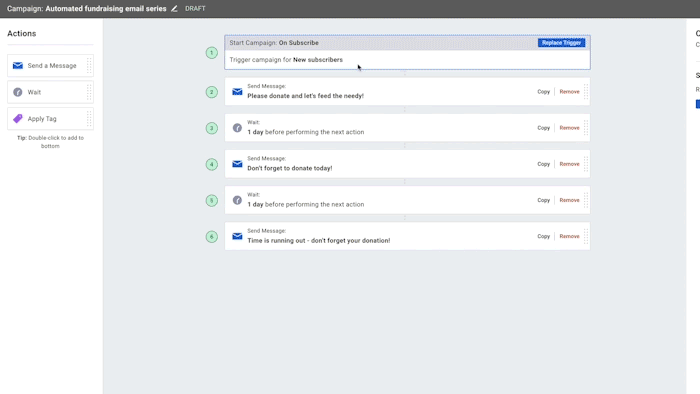
Email marketing is an essential part of your online fundraising strategy.
Email marketing can be used to ask for donations but more importantly, if done correctly, it sets the foundation for a long-term relationship. You can use a fundraising email marketing campaign to create an emotional connection between the donor and your fundraising cause.
You can set up a simple automated email series to request a donation.
1: Donation request email
Make the ask for donations in your first email. I recommend testing a couple of different fundraising email subject lines to see what works best.
In the email, you should include
- explain your fundraising goals
- what the money will be used for
- how to go about donating
Make donating as simple as possible for your readers. Include a clear and strong call-to-action, such as "donate now" and have this link directly to your online fundraising page.
2: Donation reminder email
Don't forget to send out a follow-up email to those on your email list who have not donated yet.
It's a good idea to think of this email as a gentle "nudge" or reminder to donate before the campaign ends.
Again, this email should include details about your campaign goals and mission, as well as a direct link to the campaign itself.
3: Thank you email for donation
For those who have taken the time to donate to your cause, it's important to send out a "thank you" email promptly. This will help to show your gratitude and will also provide your donors with additional information.
This email should include the dollar amount of the donation that was made (this may be important for tax purposes later on), as well as a reminder of the difference the donation will make.
Ideally, you should be sending these "thank you" emails out as soon as a donation is received. You can automatically send this email once they make a donation on your fundraising landing page.
Check out this thank you email from Nike in their support to help fight Parkinson’s Disease.
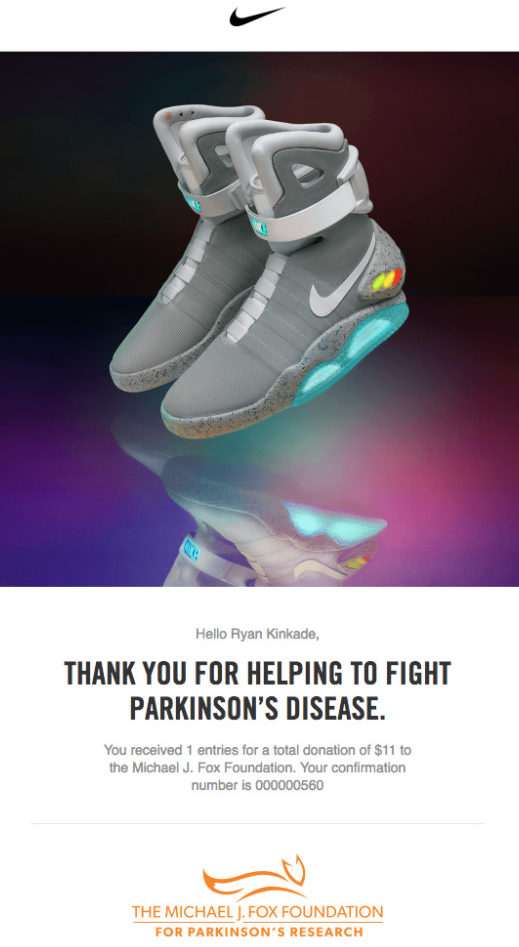
In addition to a "thank you" email, make sure that your donors are automatically directed to a "thank you" landing page after supporting your fundraising campaign.
Increase your donations with a fundraising landing page
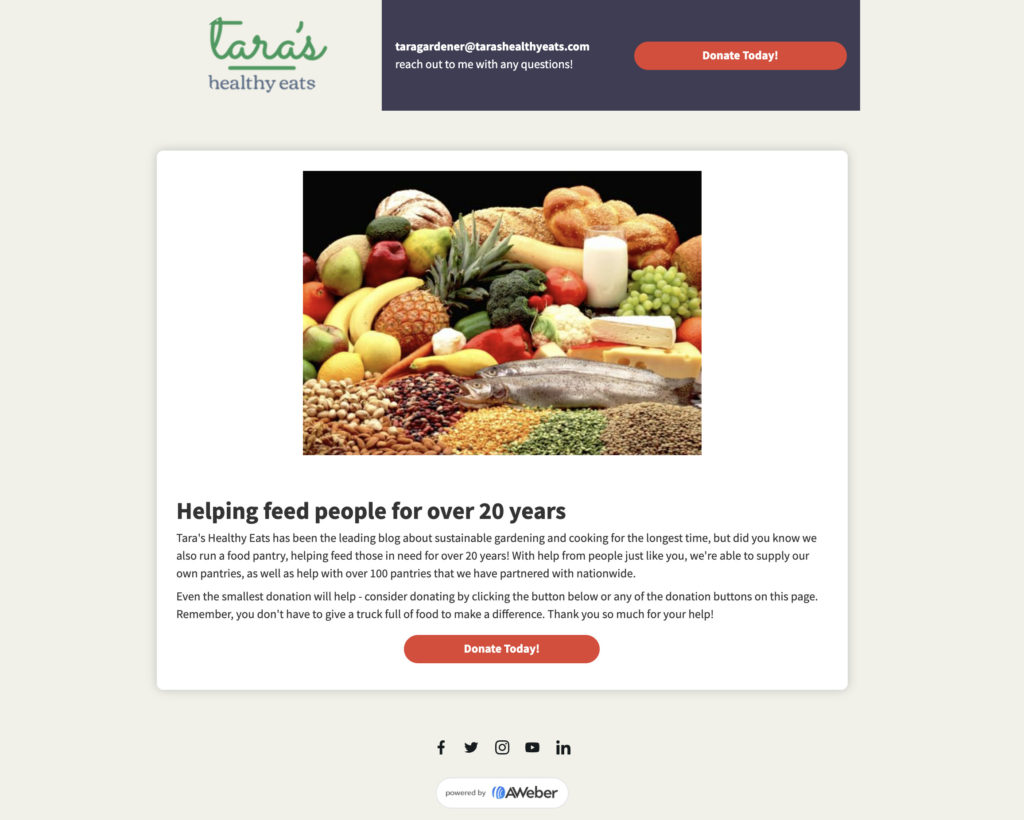
Have complete control over every aspect of your fundraising effort - from social media, to emails, to the landing page you’re sending people in order to donate.
A well crafted landing page will help increase your conversations, leading to more money for your cause. Plus, depending on who you build a landing page through, you could actually end up with even more money due to lower transaction costs.
Following landing page best practices such as writing a benefit-focused headline and keeping your “ask” to one, simple things are key to a high converting landing page.
Create a sense of community
Congratulations, you just launched a successful online fundraiser. But if you want to continue growing donations for your cause, you should be cultivating those relationships throughout the year.
To build a community around future fundraising campaigns, take time to create an email list for anybody who has donated.
This way you can keep these donors informed and engaged by sending email communications throughout the year.
Donors will appreciate being kept in the loop. Share pictures of your check presentation, let them know how much money your campaign raised, whether you reached or surpassed your fundraising goal, and how that money was actually used.
In between campaigns, focus on the solutions that previous donations continue to provide. When donors are able to see the effects of their giving first-hand, this triggers those "feel-good" moments that target people's emotions and make them more excited about contributing to your cause time and time again.
Start developing your fundraising strategy today!
If you're looking for ways to make your online fundraising efforts more successful, these tips can be a great starting point.
Likewise, businesses trying to raise money for a good cause can use many of these strategies to organize successful online fundraisers. All it takes is a little careful time, research, and planning to raise funds that will help you continue your mission!
Everything you need in one location
AWeber has all the tools and resources you need to collect donations and communicate with your audience. Email marketing, landing page builder, web push notifications—we have everything you need to run a successful fundraiser campaign.
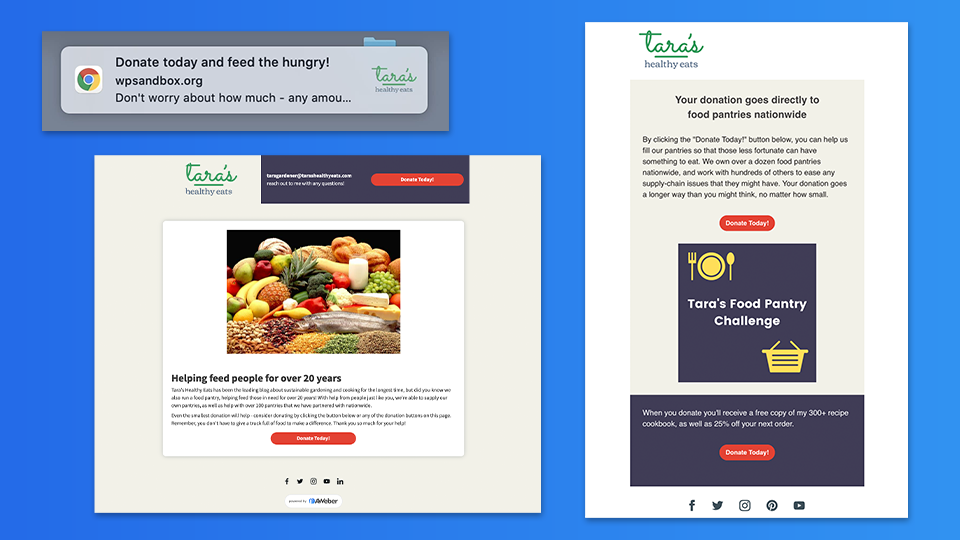
Try AWeber today by signing up for your free account.
The post How To Max Out Charitable Donations with this Easy Fundraising Strategy appeared first on AWeber.
from AWeber https://ift.tt/3mAmLMp
via IFTTT
No comments:
Post a Comment